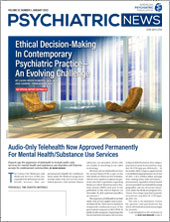Neurodiversity is about acknowledging that the brain of each person is developed uniquely, resulting in differences in abilities and behavioral traits among all people. When we explore the significance of neurodiversity in psychiatry, we have found that people with various neurodiverse conditions such as autism have characteristics that can be manifested as both strengths and challenges. It is common for people on the autism spectrum to be described as having perseverating behaviors and challenges in seeing the “big picture.” However, when the results of their behaviors are desirable and positive, their attention to details will be recognized, and the individual will be acknowledged to exhibit persistence, not perseveration. Similarly, individuals with attention-deficit/hyperactivity disorder (ADHD), hyperactive-impulsive type, are described as impulsive and hyperactive. Yet, when they use innovative ways to produce significant results, they are recognized as having high energy and creativity. In fact, neurodiversity has been regarded as a competitive advantage in the workplace.
How can we maximize the potential of neurodiversity? To enhance the abilities of neurodiverse/neurodivergent people, practitioners and researchers have taken strengths-based approaches in educational, employment, and mental health settings. The guiding principles of these approaches are often consistent with the practices in positive psychology, positive psychiatry, and the theory of self-determination. One common strengths-based approach has involved the assessments of character strengths. The Values in Action Inventory of Strengths (VIA-IS) evaluates emotional strengths, interpersonal strengths, intellectual strengths, strengths of restraint, and theological strengths. Character strengths-based interventions have been applied in the treatments of bereavement, social anxiety, and depression. During the COVID-19 pandemic, positive psychology interventions have been found to be effective in treating patients with suicidal thoughts and behaviors and health care professionals with depression, anxiety, or stress symptoms.
Strengths-based approaches have also been used to assess neurodiverse/neurodivergent individuals. Using VIA-IS, investigators have found that adults on the autism spectrum are often most characterized by open-mindedness, love of learning, creativity, authenticity, and fairness. In contrast, typically developing individuals are often most characterized by a different set of strengths —humor, love, kindness, fairness, and open-mindedness. Strengths-based interventions have also been implemented in individuals on the autism spectrum. In particular, the Better OutcOmes & Successful Transitions for Autism (BOOST-A), an online strengths-based program that supports adolescents on the autism spectrum to prepare for leaving school, was shown to enhance some career-readiness outcomes such as opportunity for self-determination at home as reported by parents, career exploration as reported by parents and adolescents, and transition-specific self-determination as reported by parents. In a recent study involving a self-determination–based transition support program for adults on the autism spectrum, the intervention was found to result in greater improvements in self-reported cognitive problem-solving and overall quality of life.
Individuals with ADHD have often been found to be highly creative. Children with ADHD have demonstrated higher novelty seeking and self-directness than their typically developing peers. Thematic analysis of interviews with successful adults with ADHD has also found that resilience, courage, transcendence, humanity, energy, and cognitive dynamism are key themes of their characteristics. Strengths-based interventions targeting students with ADHD have shown encouraging results. For example, results from the Penn Resiliency Program, a strengths-based program designed to build resilience, well-being, and optimism, was shown to improve academic performance in elementary school students.
Likewise, people with dyslexia are found to possess relative strengths in their visual-spatial capabilities, wider and more diffuse perception, image-based thinking, and abilities to fill in incomplete information. A significantly higher incidence of dyslexia was found in entrepreneurs than in the corporate management and general populations in the United States and United Kingdom. Strengths-based approaches have the potential to be applied to mental health interventions for dyslexic individuals, as positive psychology approaches were applied to entrepreneurs with dyslexia.
To provide a strengths-based blueprint to implement programs in educational, employment, and mental health services settings, we have created the Strengths-Based Model of Neurodiversity (SBMN), which is based on principles of positive psychology and positive psychiatry and anchored by the Theory of Multiple Intelligences and Chickering’s Seven Vectors of Development. Furthermore, the SBMN emphasizes that neurodiverse conditions remain as conditions rather than disorders. Strengths-based interventions are directed toward helping neurodiverse/neurodivergent individuals to overcome challenges, instead of deficits. The SBMN is also used across the entire spectrum of neurodiverse conditions and is also designed to be both person-centered and ecosystem driven. For example, the SBMN focuses on strengths that enable individuals to progress toward meeting personal goals. The SBMN is designed to help neurodiverse/neurodivergent individuals to become healthy, strengths-oriented people by raising awareness of personal strengths, increasing trust in personal ability, helping them learn to engage in relationships, and increasing self-satisfaction through success. The SBMN can be useful in moving neurodiverse individuals away from negativity and immobility.
The above concepts are further articulated in the new book of which I am editor, titled Neurodiversity: From Phenomenology to Neurobiology and Enhancing Technologies. Examples of the implementation of SBMN-based programs in educational environments and employment settings are discussed at length. Tools for positive psychology in assessments and treatments are described. This book also includes discussions on the opportunities in strengths-based approaches in psychiatry, the neuroscience of neurodiversity, design-thinking considerations of programs related to neurodiversity, and technological advances based on concepts of the SBMN. ■

